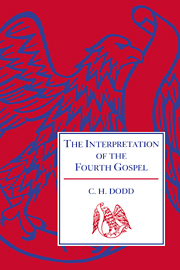Book contents
- Frontmatter
- Contents
- PART I THE BACKGROUND
- PART II LEADING IDEAS
- 1 Symbolism
- 2 Eternal life
- 3 Knowledge of God
- 4 Truth
- 5 Faith
- 6 Union with God
- 7 Light, Glory, Judgment
- 8 Spirit
- 9 Messiah
- 10 Son of Man
- 11 Son of God
- 12 Logos
- PART III ARGUMENT AND STRUCTURE
- APPENDIX: Some considerations upon the historical aspect of the Fourth Gospel
- Index Locorum
- Index Nominum
5 - Faith
from PART II - LEADING IDEAS
Published online by Cambridge University Press: 10 December 2009
- Frontmatter
- Contents
- PART I THE BACKGROUND
- PART II LEADING IDEAS
- 1 Symbolism
- 2 Eternal life
- 3 Knowledge of God
- 4 Truth
- 5 Faith
- 6 Union with God
- 7 Light, Glory, Judgment
- 8 Spirit
- 9 Messiah
- 10 Son of Man
- 11 Son of God
- 12 Logos
- PART III ARGUMENT AND STRUCTURE
- APPENDIX: Some considerations upon the historical aspect of the Fourth Gospel
- Index Locorum
- Index Nominum
Summary
Along with γινώσκειν the evangelist uses the term πιστεειν, which is in fact considerably more frequent in the gospel. That there is some close association between the ideas is shown by the fact that in vi. 69 they are used together, πεπιστεκαμεν καì γνώκαεν σγιō τō θεō. An investigation therefore of the meaning of πιστεειν is here in place.
In Greek literature the word is used both transitively and intransitively. Transitively used it means ‘to entrust’. This use occurs once in the Fourth Gospel, ii. 24 ōκ πíστενεν ατòν ατōî, but without any special significance. Intransitively used, the verb has two main meanings, ‘to give credence to’, ‘to believe’, and ‘to have confidence in’, ‘to trust’. Normally, the verb in the latter sense is construed with a dative, in the former sense with a 6*n-clause or the like. But the close connection of the two senses is well illustrated by Xenophon, Mem. 1. 1. 1–5. Socrates, it is there said, made statements and predictions on the ground of the warnings he received from his δαιμóνιōν. He would not have done so εî μή πστενεν άληθεσειν (if he had not been confident that he would be speaking truly). But, Xenophon proceeds, τατα δ τí oν oλλc πιστεσειεν f θεec; The belief that certain things are so is in the last analysis a trust in the veracity of God. Thus both a moral and an intellectual element enter into the sense of die word; but it would be true to say, by and large, that in Greek literature the intellectual element is the controlling one.
- Type
- Chapter
- Information
- The Interpretation of the Fourth Gospel , pp. 179 - 186Publisher: Cambridge University PressPrint publication year: 1953

